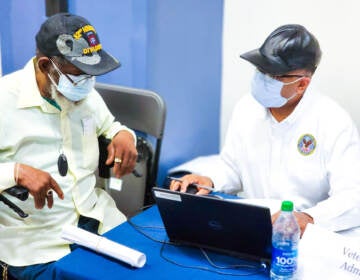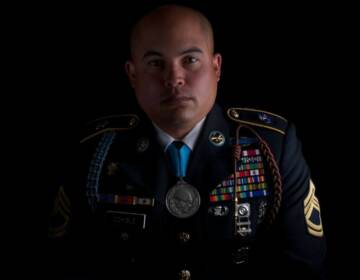Veteran sends funny messages with a serious mission
Zachary Bell wants to create a positive online community with fellow veterans through humor, inside jokes, and messages about mental health.
Listen 07:32
Zachary Bell wants to create a positive online community with fellow veterans through humor, inside jokes, and messages about mental health. (Courtesy of Zachary Bell)
This story is from The Pulse, a weekly health and science podcast.
Find it on Apple Podcasts, Spotify or wherever you get your podcasts.
Shared experience and hardship often breed their own kind of humor: the inside jokes and expressions only people in the group will understand. As a civilian, Zachary Bell missed the camaraderie of the Marine Corps, and he was deeply upset by the amount of suffering he was seeing among his fellow veterans following deployments.
So he decided to draw on that shared humor to reach his fellow vets with positive messages, or just something that would make them smile. He took a piece of cardboard, a marker, and wrote, “Take Motrin, drink water, and change your socks.” The pandemic had just started to change life dramatically in the United States, and Bell thought this old and well-known military “medical” advice would make people laugh.
“It’s because it’s really literally what you’re told to do for anything, especially while you’re in the active service,” Bell said.
He posted a picture of himself holding the sign on Instagram, and “Veteran with a Sign” was born. The Instagram page now has close to 90,000 followers.
Bell said he chose simple cardboard signs as a way to communicate as a contrast to most other things people will see on Instagram. “Everything is filtered, screened, you know, colors are balanced. And I was really kind of thrown by this juxtaposition of low technology on a high-technology platform.”
But, he said, there’s more than immediately hits the eye.
“I think about it like an infographic. Like, there’s something I want to tell you. But it might not just be the words, it might be how I’m dressed or where I’m at. But you have to look at the picture, and I want the layers to be there.” He is typically pictured wearing a baseball cap backwards, a military green T-shirt that shows off his tattoos, and sunglasses.
Bell, who was a Marine infantry rifleman, left active duty in 2011. He was deployed twice to Afghanistan during his military career. “I think in particular with military service, you have these really life-changing experiences and there’s some bonding that happens. I think that comes from just service to others in general.”
He said many veterans feel a sense of deep isolation when they get out of the military. “After you’re done, you just kind of scatter to the wind, to all the different corners of the country.”
He’d felt that sense of loneliness, especially after he first got out, and it started to come back up again as the country started to go into pandemic lockdowns.
“And I was like, what if I made a healthy online community? What if I was able to get people to laugh more and hurt themselves less?”
Many of the messages Bell posts on “Veteran with a Sign” are light-hearted and funny — things like, “I joined for the discounts,” or “Are you hurt or are you injured?”
Some feel like inside jokes for those who have served: “Chili Mac is the best MRE,” or “If I was a Seal, this would’ve gotten me a book deal.”
Subscribe to The Pulse
But among the jokes, Bell includes more serious messages he wants to convey to his fellow vets — reminders to text their buddies, or that it’s OK to disagree, or to seek help for mental health issues.
“Since leaving active duty, I’ve lost more people after the war than I did to it,” Bell said. “People just feel alone. It’s hard, and you have to find ways to process and move through that.”
Posting the signs feels like a creative writing project, Bell said.
“If I tell people every day not to kill themselves or, you know, work on what they’re doing, it doesn’t really seem to resonate as much as if I pepper that in with jokes about trying to find Humvee keys, which there are no keys, and things like that.”
Bell said the recent U.S. withdrawal from Afghanistan was a difficult time and brought up many tough emotions that he struggled with. And sometimes, he said, difficulties are brought on by a mindless comment by another person who has not been in the military.
He recalled a time a few years ago when he was working out at his local gym. Another man commented on his tattoos, and asked whether Bell had been in the service. Bell answered that he had served in the Marines.
“And he looked at me, he goes, ‘Hey, you don’t have any of that PTSD stuff, do you?’ And I said, ‘Well, kind of comes with the territory and … have a nice day.’ I just kind of ended the conversation there. And … almost everyone I know has an experience like that.”
He hopes his social media presence will not only connect veterans with one another and make them feel less alone, but also contribute to more understanding for veterans among civilians.
“I think the best way to connect people and understand their experiences,” Bell said, “is just to be there and encourage them and talk to them, and then just hold space long enough for them to let you in.”
WHYY is your source for fact-based, in-depth journalism and information. As a nonprofit organization, we rely on financial support from readers like you. Please give today.







